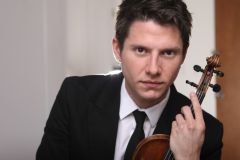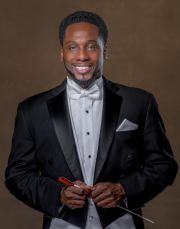Conducting Concentration
Master of Arts, Music
Most programs in the UCF School of Performing Arts require an audition or interview.
The Conducting Concentration for the M.A. Music degree program is designed for students who are ready to take their conducting career to the next level. Through academic coursework, individualized instruction, and extensive podium time in rehearsal and performance with UCF ensembles, this program provides the advanced education, training and experience to position students for high-level professional application and further study. Students can pursue the program either part-time or full-time to fit your schedule and some assistantships are available for full-time graduate students in music.
The concentration includes four semesters of private conducting study, including repertoire study, to provide intense training in conducting. Student will also conduct graduate recital performances and take a comprehensive exam as a culmination of their experiences.
Students pursue the M.A. in Music program for a variety of reasons, including to increase their skills in their primary area, add training for a secondary area and to learn more about their craft. The higher credential may allow for a pay raise, qualification for certain teaching positions, such as teaching at the college level, or to prepare for application to doctoral programs.
Why study at UCF?
What sets UCF apart is that graduate students will work with and learn directly from highly trained faculty that are at the top of their field. UCF is also the only music graduate program in Central Florida. Because the campus is in Orlando, an international hub of entertainment, many graduates take advantage of gaining experience through freelance gigs, theme park work and more while completing their studies.
Alumni of the M.A. Music program have had successes in many areas. Some stay in their current positions with added confidence and skill while some have used the degree to qualify for new positions, such as college or university level instructors. Others have gone on to doctorate programs in performance, musicology and more.
Graduate Teaching Assistantships
A limited number of Graduate Teaching Assistantship positions normally become open for the fall semester each year. Some of the positions are targeted toward specific areas of need (such as concert support and recording, marching band or class piano), and others are more general (such as assisting with large lecture classes). In return for work in the department assisting with courses, GTA students receive a waiver for the tuition portion of 9 credit hours each semester, health insurance and a cash stipend. Normally, students will be supported for four semesters, if the work and academic achievement is satisfactory.
All prospective students are encouraged to apply using the department’s Graduate Teaching Assistant application form.
GTA APPLICATION
Graduate Theory Diagnostic Test
All Music MA students are required to take the Graduate Theory Diagnostic Test at the beginning of their first semester. The purpose of this exam is to confirm that the student is properly prepared for music theory study at the graduate level. Please click here for further information and preparation information: UCF Graduate Theory Diagnostic Test.
Application Requirements
Music Auditions 2026
February 7, 14, 28: Scholarship auditions
March 28: Non-scholarship auditions
Request an Audition1. Apply to UCF Graduate Admissions
In order to apply for the Master of Arts, Music degree program, you must first apply to UCF through the College of Graduate Studies at https://graduate.ucf.edu.
As part of the UCF Graduate Studies application, you will be presented with one of four ways to be considered for acceptance by the Music faculty: audition, submit a portfolio, submit a recording, or be interviewed.
- Instrument/Voice Auditions. Department auditions are scheduled on campus on the dates listed above. If the applicant chooses or these dates are impossible, then a digital audition recording may be submitted through Acceptd. In some cases, an alternate date may be arranged. Check the Music Degree Audition Requirements page for specific requirements on individual instrumental and voice types.
- Portfolios are most appropriate for composition applicants.
- Interviews are appropriate for other areas.
2. Letters of Recommendation
Two letters of recommendation are required. These may be submitted online through the Graduate Studies application, or sent directly to the music department.
3. Transcripts
All college transcripts are required to be submitted to the graduate admissions office.
4. Writing Sample
The applicant must submit a scholarly or academic essay of at least 1,000 words (about 4–5 double-spaced pages) on some topic in music or music education, written in formal prose (as if for submission in a music history or theory class for a grade). You may submit a paper that you used for a previous course, but please note this is not an essay about why you like music or why you want to go to graduate school. Essays on any era or style, and popular or non-Western music are acceptable. The paper should state a thesis, provide supporting evidence for the thesis and lead to a conclusion. Ideally the paper should make use of various sorts of reliable information, which you cite through some form of footnotes, end notes or inline citations, and which are then listed in a bibliography after the body of the text.
5. Achievement and Pre-Screening
Supplemental to the application file for admission to UCF’s College of Graduate Studies, MA Conducting applicants should also submit the following pre-screening materials directly to the Director of Bands, Director of Orchestral Studies, or Director of Choral Activities, in accordance with their emphasis (instrumental or choral):
- Current resume highlighting significant musical and professional accomplishments
- 15-20 minutes of conducting video: performance, rehearsal, or a combination of both
Through faculty review of all application and supporting materials, faculty leaders will select candidates to invite to campus for in-person audition and interview. Faculty leaders will communicate directly with those candidates to schedule their visit to UCF’s campus and to settle on specific repertoire to be used in live conducting audition.
Frequently Asked Questions
How is the Master of Arts in Music different from a Master of Music degree?
The M.A. in Music allows more flexibility in the curriculum and in structuring specialty areas as needed than the M.M.
I have a job that I don’t want to quit. Can I work on the M.A part-time or in the summer?
Yes. The course offering schedule will accommodate full-time professionals by offering evening courses during the academic year plus limited courses in the summer. Full-time study is considered to be nine credit hours per semester, but students may study part-time, taking as many courses as their schedule permits.
Can I major in a specific area, such as performance or conducting?
Two Concentrations are offered: the Conducting Concentration provides intense training in the art of conducting, with repertoire study included; and the Music Studies Concentration provides flexibility to allow students to focus on other areas of interest, such as instrumental and voice performance, music history, music education, composition, and more.
Does the UCF Music Department ever plan to offer a Master of Music degree?
The Music Department may consider a Master of Music in the future. However, the Master of Arts in Music has the flexibility to allow students to focus on their areas of interest.
Where can I get more information about graduate studies at UCF?
Visit the UCF College of Graduate Studies website
Are courses offered online?
The department offers a limited number of online courses in the M.A. in Music.
Contact
Program Coordinator
Choral Conducting
Orchestral Conducting
Robert Hasty
Director of Orchestra
hasty@ucf.edu



